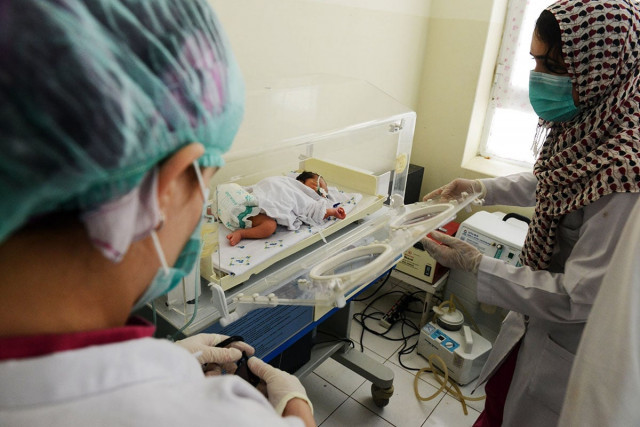Safer child birth: Changes in community midwife practices sought
Say cultural barriers, lack of access to equipment major barriers for skilled attendants

About half of CMWs studied are young, single women who studied up to grade 10, but received vocational training, sometimes (more often than not) alongside a gynaecologist. PHOTO: AFP
In Pakistan, one in every 11 children will die before their fifth birthday, according to the Pakistan Demographic and Health Survey 2013. Researchers argue not enough is being done locally to improve the operational reach of community midwives (CMW) who can improve maternal, neonatal and child health care.
The use of community midwives before, during and after childbirth, though still a relatively uncommon practice in Khyber-Pakhtunkhwa (K-P), has been proven to save lives of children and mothers. A recent CMW survey in Swat and Mardan was led by researchers from Pakistan’s Human Development Programme (HDP), Health Services Academy (HSA) and International Islamic University, Islamabad.
Demographics
About half of CMWs studied are young, single women who studied up to grade 10, but received vocational training, sometimes (more often than not) alongside a gynaecologist. Swat and Mardan were the only districts in K-P which had CMWs working there for at least one year at the time the survey was held from May to August 2011. In contrast, over a dozen districts in Punjab met this criterion.
Cultural, technical barriers for CMWs
On gender polemic as an inhibitor of socio-economic improvement, Shafiqur Rehman, a HDP researcher, said, “The difference between Punjab and K-P is the openness of society to females and also cultural barriers of females working in the community.” Rehman continued, “That means it is difficult for CMWs to get established in the community without somebody continuously supporting them in the first two to three years of their work.”
The research reveals that ranked amongst the top difficulties for CMWs when delivering services are financial constraints, sufficient training needs, lack of essential supplies, lack of ambulances, difficulty building relationships in the community and difficulty accessing higher-level health facilities for complicated cases in rural areas.
Another of the survey’s researchers, former HSA employee Jamil Ahmed explained the goal behind the study was to improve the practice of CMWs in hopes of alleviating some of the abovementioned operational barriers CMWs face. For him, the lack of equipment and quality training needs to be addressed by the provincial government.
With the right kind of access
Ahmed told The Express Tribune, “More than half of all births are taking place at homes with unskilled traditional birth attendants and without modern means of care.” He added, “If there are places where strategic health facilities are not in place, CMWs can be a wonderful option.”
Last summer, CM Pervez Khattak and the K-P Health Department launched the Initiative for Mother and Child Health (IMCH) to counter the high infant mortality rates here in K-P. The primary goal of Khattak’s IMCH was to increase the number of deliveries which employ a skilled birth attendant, using government health facilities and community midwives.
The initiative provides up to Rs2,700 to pregnant women and new mothers across 10 districts in K-P for antenatal visits, delivery and post-natal check-ups.
In 2014, most of the government funding was spent on delivery aid, which was used by nearly 5,000 women in the province.
“Women getting a package from the government in the new system and CMWs visiting these women can bring tremendous change in maternal and child survival,” added Ahmed. “But, there is still a lot to be done to upgrade the quality of services the existing midwives provide,” he argued, highlighting that Pakistan Tehreek-e-Insaf dharnas distracted them from addressing more serious issues in the province.
Published in The Express Tribune, January 29th, 2015.













COMMENTS
Comments are moderated and generally will be posted if they are on-topic and not abusive.
For more information, please see our Comments FAQ